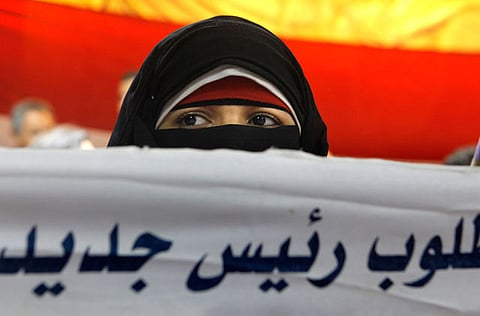Egypt: Tahrir Square in revolutionary mood
Tahrir Square regained its revolutionary fame with protesters packing the Cairo plaza for a rally

Cairo: The epicentre of an uprising that toppled Hosni Mubarak more than two years ago, Tahrir Square, on Sunday regained its revolutionary renown with opposition protesters packing the Cairo plaza for a rally against Islamist president Mohammad Mursi.
Patriotic songs reminiscent of the 2011 revolt against Mubarak reverberated on loudspeakers across the square as protesters chanted: “leave!” Self-styled guards from the protesters were deployed at the entrances of the square to check participants’ identity cards to ensure that troublemakers would not “infiltrate” the crowd.
The rally initiated a protest campaign launched by the secular-minded opposition to press Mursi, who hails from the Muslim Brotherhood, to step down and call early presidential elections.
“Mursi has failed par excellence in ruling the country,” Hassan Ihab, a chartered account, told Gulf News.
“A year after he assumed the presidency, Mursi has proved to be too incompetent even to govern a small town,” added Ihab, 34, who joined dozens of protesters in camping in Tahrir on Friday.
Egypt has been hit in recent months with daily problems of electricity, fuel and water supply shortages.
“Mursi has proved to be the delegate of the Brotherhood at the presidential palace and not the president of all Egyptians as he promised,” said Ihab.
The opposition accuses Mursi, who took office exactly a year ago, of betraying the revolution that brought him to power and vowed to force him to resign.
“The Brotherhood have talked a lot about the legitimacy of the [ballot] box. If so, why are they afraid of early presidential elections then?” said Antoun Beshara, a Christian engineering student. Mursi’s Islamist allies have threatened to use force to stop any bid to oust Mursi whose term ends in 2016.
Thousands are camping in Rabaa Al Adawia in eastern Cairo, around five kilometres from the presidential palace.
“The worst thing done by Mursi is that he has caused sedition and divided Egyptians into two camps: opponents and supporters.”
Christians, who account for 10 per cent of Egypt’s mostly Muslim 85 million population, have expressed concerns about their future since Islamists rose to power in the post-Mubarak era.
“This division is alien to Egypt. I think Egyptians will not return to their houses this time before this hateful regime is removed,” said Beshara, 21.
In the background, hundreds of protesters marched around chanting: “Down with the ruling of the supreme guide,” referring to the Brotherhood’s spiritual leader accused by the opposition of dictating to Mursi.
Later on Sunday, the protesters, led by the youth opposition Tamarod group, were to head to the presidential palace in Heliopolis in eastern Cairo to start an open-ended sit-in to push Mursi to resign.
Tamarod has said it collected more than 22 million signatures demanding Mursi to step down and clear the way for an early presidential vote. Mursi dismissed the calls as “absurd and unlawful”.
His allies have played down the significance of Sunday’s protests. “The day will end like any other day,” Essam Al Erian, a senior Brotherhood official, wrote on the Facebook. “By midnight, the bankrupt analysts will end their talk and Egyptians will go to bed for rest before waking up for a new day on which they will go round their usual business.”
Sign up for the Daily Briefing
Get the latest news and updates straight to your inbox


